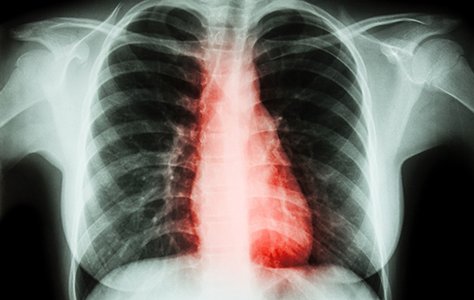Insomnia - often caused by heart disease
Restful sleep is important for our health; a lack of it often has an effect on the heart. If it is regularly difficult to sleep through the night, this may in turn be due to an undetected heart disease. You can find out more about how sleep and heart disease are linked here.
Everyday stress, noisy neighbors, breastfeeding or a snoring partner - all these factors often deprive people of sleep. Although it can be tolerated in phases, permanently disturbed sleep and the associated lack of rest pave the way for heart disease; this is well known. However, the fact that symptoms such as sleep problems can also be caused by an existing, unrecognised heart disease is less so.
Lack of sleep due to heart failure

Frequent trips to the toilet at night interrupt sleep. There are many possible causes for an increased urge to urinate at night, such as excessive fluid intake before going to bed or drinking diuretic drinks. However, if this symptom occurs more frequently or together with swollen legs during the day, it could be due to heart failure. This is often the result of existing coronary heart disease (CHD) or high blood pressure (hypertension); both diseases do not necessarily cause symptoms at first and are therefore perhaps not yet known.
In the case of CHD, the heart muscle is less well supplied with blood and is therefore too weak to maintain effective blood circulation. If a heart attack has already occurred, the scarring of the heart muscle ensures that the heart muscle cells are less mobile. As a result, the heart loses its pumping power.
This weakness can affect both the right and left side of the heart, but also both sides at the same time Depending on which side is affected, the symptoms manifest themselves differently.
Going to the toilet at night with right heart failure
With right heart failure, blood builds up in the leg veins - the blood vessels that carry blood from the body towards the heart. Fluid then seeps through the bulging veins into the surrounding tissue, causing the legs to swell (oedema). At night, when the legs assume a horizontal position when lying down and are therefore relieved, the fluid flows back into the vessels and reaches the bladder. This causes the urge to urinate at night (nocturia), which disturbs sleep - especially if the bathroom has to be visited more frequently.
Left heart failure dictates lying position
If the left side of the heart is affected by the insufficiency, blood builds up in the pulmonary vessels, causing shortness of breath (dyspnoea), especially during exertion. However, shortness of breath can also be caused by obesity, insufficient exercise or, for example, chronic obstructive pulmonary disease (COPD), which may mask the presence of heart failure in those affected.
If, on the other hand, sufferers frequently toss and turn in bed at night or have the feeling that they need to elevate their upper body in order to sleep without coughing, pain or shortness of breath, it is advisable to consult a doctor, because: While the healthy heart is adjusted to the stronger blood flow from the body when lying down, this places a strain on the left side of the heart with heart failure, which pumps the blood into the systemic circulation. This is all the greater if the affected person is lying on the left side of the body. For a quieter night, lying on the right side of the body is therefore recommended.
Obstructive sleep apnoea interrupts sleep phases
People with heart failure often also experience breathing disorders at night, known as sleep apnoea - obstructive sleep apnoea is the most common form. It is characterized by snoring and nocturnal mouth breathing. During the course of the night, the pharynx repeatedly narrows, which means that an adequate supply of oxygen is no longer possible during these periods. The lack of oxygen in the brain triggers a stress reaction with hormone release, which disturbs sleep several times a night. Mouth breathing also dries out the mucous membranes and provokes night-time coughing fits. These regular interruptions to sleep encourage the development of high blood pressure (hypertension).
Heart valve disease - cause of insomnia?
Other heart diseases that can cause disturbed sleep are various heart valve defects, such as narrowing (stenosis) or leakage (insufficiency) of the aortic or mitral valves. If these conditions are advanced, you may experience shortness of breath or a chesty cough even when lying down - both of which are disruptive to healthy sleep.
If mitral valve regurgitation has been diagnosed, for example, it can be treated with the MitraClip™ as part of a minimally invasive procedure. This is a clip that is advanced via a catheter through the leg vein from the groin to the right atrium and through the cardiac septum to the left atrium. Here, the MitraClip™ supports the diseased heart valve by bringing the leaflets together so that the valve closes tightly again. This gentle procedure could have a positive effect on sleep disorders.
If the aortic valve is narrowed (aortic valve stenosis), it can be replaced using a gentle, minimally invasive procedure. The TAVI procedure (transcatheter aortic valve implantation) is suitable for people who
- live with concomitant diseases,
- have a medium to high surgical risk,
- are of advanced age or
- are frail.
In this procedure, the surgeon does not replace the defective aortic valve, but replaces it with a biological aortic valve made of animal tissue (such as the Navitor™ valve) folded into a fine tubular metal mesh. This is advanced into the heart via the inguinal artery to the defective aortic valve using a catheter. As soon as the new aortic valve is correctly positioned, it immediately takes over the function of the old one. The symptoms often subside after the procedure, meaning that sleep disorders can also improve.
Angina pectoris - makes you startle at night
High blood pressure - which can remain asymptomatic for a long time - damages the blood vessels in the body and organs in the long term. In order to adapt to the long-term high blood pressure, the muscle of the left ventricle thickens by forming new connective tissue and new heart muscle cells (hypertrophy). This stiffens the heart and hinders its mobility and thus its pumping action. A feeling of tightness in the heart (angina pectoris) occurs when the blood vessels that supply the muscle with oxygen do not develop to the same extent as the heart muscle grows and the arteries running through it are also constricted. If this stabbing and oppressive pain occurs not only during the day, but also at night when lying down, it can disturb your sleep.
Clarify sleep disorders with a doctor
Restful sleep is important for heart health. However, if this is already compromised, a diseased heart can in turn be the cause of problems falling asleep and sleeping through the night and further damage the heart. Although the urge to urinate at night, coughing fits or shortness of breath can occur for various reasons, they regularly disturb your night's sleep and should be investigated by a doctor.
Symptom check as a self-test
With the practical symptom check, you can quickly test whether you have symptoms and limitations that indicate heart failure. With the help of a total of 12 questions, the symptom check creates an individual health profile for you, which you can also print out and bring with you to your next visit to the practice.
- References
- Nocturia and Heart Failure. NHS. Heart failure. Available at: www.nhs.uk/conditions/heart-failure/ Accessed: 24 September 2025.
- Hypertension in adults: diagnosis and management. NICE guideline NG136. Published: 28 August 2019. Last updated: 21 November 2023.
- Available at: www.nice.org.uk/guidance/NG136 DOI: 10.1016/S0140-6736(20)31461-431461-4)
- Chronic heart failure in adults: diagnosis and management. NICE guideline NG106. Published: 12 September 2018. Last updated: 3 September 2025. Available at: www.nice.org.uk/guidance/ng106 DOI: 10.1136/bmj.k3646
- Sleep apnoea. Available at: www.nhs.uk/conditions/sleep-apnoea/ Accessed: 24 September 2025.
- Sleep medicine and the cardiologist. Heart 2020;106:864–870. Available at: heart.bmj.com/content/106/11/864 DOI: 10.1136/heartjnl-2020-316722
- Heart valve disease. Available at: www.nhs.uk/conditions/heart-valve-disease/ Accessed: 24 September 2025.
9-UK-5-16526-01 08-2025

